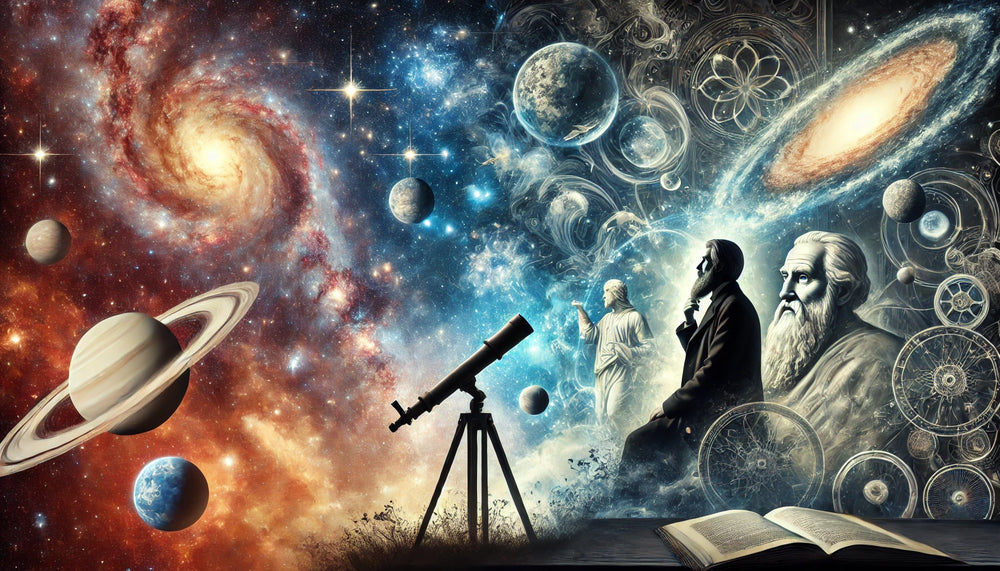Your Cart is Empty
Free US Shipping
Free US Shipping
Looking up at the stars is a breathtaking experience, no matter who you are. You don’t need to be a scientist to be in awe of all the things happening in the universe. However, with all the terms thrown around in everyday conversation, it can be difficult to figure out the differences between things like astronomy and cosmology.
Astronomy is the study of space, the universe, and the components that make them up. Cosmology is a much broader and more philosophical branch of science that looks at the universe as a whole. There are many overlapping areas between these fields, as cosmology is a subset of astronomy.
In this article, I’ll detail everything you need to know to get foundational knowledge on the differences between astronomy and cosmology, including when they both began.
Astronomy is a branch of science that studies everything in space, from stars to planets and everything in between. Because the subject is so vast, scientists break it down into four main fields.
Space is massive, and there are so many things about it to be studied that having it all generalized in one category isn’t very efficient. It would be impossible for aspiring astronomers to study everything and begin working in the field.
To solve this problem, it’s been subdivided into more specific fields of study.
Currently, there are four specific fields of astronomy, each of which covers a particular topic in this area of science. Each can also be further subdivided into even more specific areas of study.


The four fields of astronomy are:
Unlike other sciences, it’s difficult to determine a specific time when astronomy began.
That’s because there has been evidence of people attempting to study space for thousands of years.
However, many people like to look at two time periods to narrow down how long astronomy can be considered a science field.
The first recordings of astronomy being studied in a specific and focused way go back over 3,000 years ago in Mesopotamia. However, there are records of people studying the stars before that.
Some of these records date back a thousand years longer. In these cases, this sort of studying was likely more individual and casual, with less focus on trying to figure out why space and its elements are the way they are.
Cosmology is a subset of both astrophysics and, by default, astronomy. However, it gets a little more complicated than just being a more specific type of astronomy. Cosmology is both specific and very broad in its study because it looks at the entire universe.
It’s a specific science because it only looks at the big picture of these elements and often theorizes how the universe began and how it will develop as a whole.


Like other types of astronomy, however, cosmology can be subdivided into four categories:
An excellent example of cosmology to remember if you’re having trouble understanding the topic is the big bang theory of how the universe began.
Since that theory covers how everything in the universe started, it would fall under the cosmological field of astronomy.
The beginning of cosmology might be even more difficult to pinpoint than the beginning of astronomy in general.
In fact, some people would claim that cosmology is as old as humanity.
That’s because it seems natural to assume that people have always wondered how the universe began.
However, while that might be technically true, the actual scientific study of cosmology can be dated much later.
It’s commonly agreed on in the scientific world that cosmology as its own discipline of study started in the early 1900s with Einstein’s theories of the universe.
However, even that answer is technically incorrect.
Since much of cosmology is based on theoretical models and often focuses on how the universe and life began, it was commonly thought of as a type of philosophy until after the mid-1900s.
Since cosmology and astronomy are closely linked, it can be challenging to see the differences between these two disciplines.
Both these fields can be subdivided into more specific categories.
They both study space and the universe.
It’s even similarly difficult to pinpoint when both of these studies began, though a more official starting point for more serious scientific studies has been agreed upon regarding both fields.
However, while it’s clear there are some overlapping areas, these two areas of scientific study are quite different.
The main difference between cosmology and astronomy is that astronomy focuses on both large and small scale things within the universe, while cosmology focuses only on the largest scale versions of things.

This chart will outline a few other key differences.
| Astronomy | Cosmology |
| Started officially around 1000 BCE. | Started officially after 1917 and as a science after 1960. |
| Is an umbrella term that covers multiple different disciplines. | Is a subset of astrophysics, which is, in itself, a subset of astronomy. |
| Studies the universe, including plants, stars, and other celestial bodies specifically. | Studies the universe as a whole, particularly how it started and its future. |
| Can study large or small scale things in space. | Only focuses on the largest scale versions of the universe. |
As science becomes more accessible, more scientific vocabulary has started making its way into our language, including astronomy and cosmology, making it easy to get things mixed up.
Cosmology and astronomy are two very vast and fascinating scientific fields of study.
While they are similar in what they study, some important differences make these fields distinct, with cosmology being a very broad, large-scale study of the universe and astronomy being more focused on space in general with more specific subcategories.
